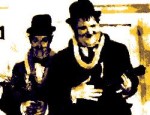Film Review
Although it is clearly not one of Ealing's better efforts,
The Magnet is a film with
considerable charm, offering a depiction of childhood that is both true
to life and poignant, despite being somewhat mired in middle class
morality. The film was an unusual departure for director Charles
Frend, who is better known for his realist wartime dramas - notably
San Demetrio London (1943) and
The Cruel Sea (1953) - and the
classic biopic
Scott of the Antarctic
(1948). The script was written by T.E.B. Clarke, who worked on
some of Ealing's best comedies, including
Passport to Pimlico (1949) and
The Lavender Hill Mob
(1951). James Robertson Justice makes a brief appearance in the
film, playing a
tramp. He is credited with a Gaelic pseudonym since he was
standing for Parliament as a Labour candidate in the 1950
General Election.
The Magnet would be pretty
lightweight stuff, a bland children's morality film, were it not for
the arresting screen presence of its star, 11-year old James Fox (known
at the time as William Fox) in his second film appearance and first
leading role. Fox gives an admirable performance that renders
what could be an unsympathetic character (a smart arse kid who torments
his parents, plays cruel jokes on homeless people and swindles younger
children) very likeable. More than anything, it is the
vulnerability and innocence that Fox brings to his character that makes
the film's slightly contrived denouement so exquisitely heart-rending and memorable.
© James Travers 2009
The above content is owned by frenchfilms.org and must not be copied.
Film Synopsis
10-year-old Johnny Brent has an over-active imagination and an
inquisitive nature that often get him into trouble. His father is
a professional psychologist who encourages what he sees as normal
behaviour for a boy of his age. One day, whilst playing on the
beach, Johnny sees another, younger boy playing with a large
magnet. Determined to get the magnet at any cost, Johnny coerces
the other boy into swapping it for a pretend invisible watch. No
sooner has he acquired the magnet than Johnny becomes wracked with
guilt for the cruel deception he played on the youngster.
When he imagines that the other boy died from distress caused by losing
his precious toy, Johnny gives the magnet away to the inventor of an
iron lung. Impressed by the boy's generosity, the latter auctions
the magnet off to raise money so that a hospital can purchase one of
the iron lungs. This makes Johnny a local hero and the town's
dignitaries are eager to present him with a medal for civic duty.
Unaware of this, Johnny goes into hiding, convinced that he will be
punished for killing another boy through his selfish act...
© James Travers
The above content is owned by frenchfilms.org and must not be copied.



